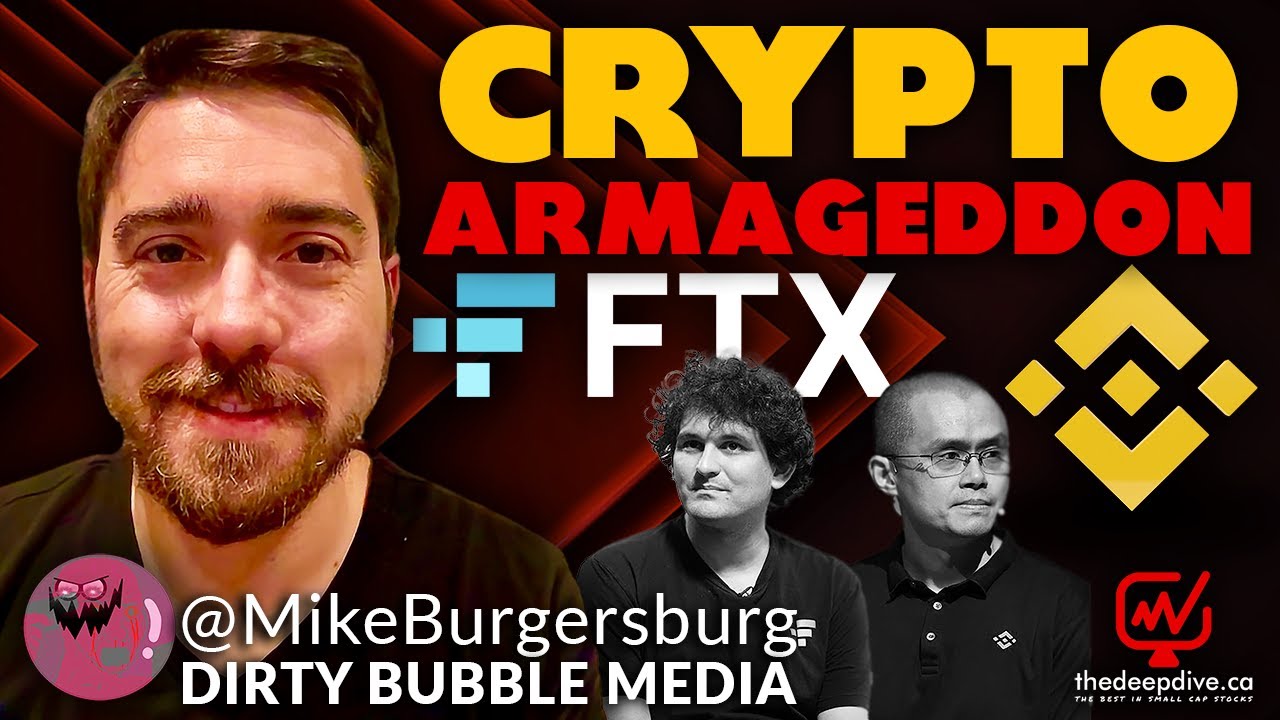
Joining SmallCapSteve today is Mike Burgersburg of Dirty Bubble Media. Mike was instrumental in the events surrounding CZ and SBF, and FTX in the past couple of weeks. He joins us today to talk about crypto and all that he’s uncovered in his research.
[Intro] Good afternoon everybody. Today I am joined with Mike Burgersburg from Dirty Bubble Media.
In case you were sleeping under a rock this week the second largest crypto Exchange in the world, ran by Sam Bankman-Fried, who happens to be CNBC’s Wonder Boy, often referred to as the next Jamie Dimon of the next JP Morgan saw their exchange and sister hedge fund Alameda Research go bankrupt.
Which really all started to unravel when Coindesk reported on the balance sheet of Alameda.
Which then got examined by a sub stack called Dirty Bubble media, ran by a guy named Mike Burgersburg.
Which then got liked on Twitter by a guy named CZ, who happens to run the largest crypto exchange in the world called Binance.
Which then set off a Twitter feud between Sam Bankman-Fried and CZ.
Which then led to Binance dumping all of their FTX tokens (also called FTT).
Which then created a ton of FUD and a massive amount of withdrawals from the FTX crypto exchange, leading to FTX announcing that they had an $8 billion hole in their balance sheet and filing for bankruptcy.
So guys I’m really happy that Mike took the time to join us today. He was instrumental in the events that happened over the last two weeks and was kind enough to sit down with us and answer a few questions.
All right everybody enjoy the interview.
[Steve] Mike thanks so much for joining us today.
[Mike] It’s good to be here.
[S] Okay so I just uh.. across my desk here, somebody sent me a tweet that shows Alameda, which for our audience who’s unaware, this was sort of the sister hedge fund that was effectively a part of FTX depending on I suppose how you want to look at it. It shows a pitch deck for them to try to raise money from investors back in 2018, and they had a product that offered 18% returns with no lock-ups.
Now when I see this stuff – and look I come from the Canadian Venture markets where we see a lot of garbage to put it nicely – what do you think is going through investors heads when they see 18% annual returns and no lock-ups.
[M] You tell me. I honestly – I can’t explain that kind of psychology, especially when you’re talking like large and institutional investors who have no excuse. I have no clue, no clue at all. It’s – I mean it’s amazing that someone could just ignore the most like cardinal signs of a classic Ponzi and just dump money into something like that.
[S] It’s interesting because we did multiple interviews with the Celsius guys over the last two years. We were incredibly fascinated by it because we looked at their marketing materials and I think that first we interviewed one of the young guys there, I forget his name, I think his first name was Zach and then eventually we did a couple interviews with Alex Mashinsky. Basically asking them outright “is this a Ponzi?” And what was so fascinating about it was, you know, they were offering these huge returns but when we asked them “how are you generating these returns?” we never got an answer that made any lick of sense.
[M] All that’s because they couldn’t come up with a good answer themselves, because they weren’t doing it. I mean we know from filings now that they never, they never turned a profit. As far as, far as if Vermont is accurate in their assertions, yeah they never, they never were generating the yield they claimed to so.
[S] So how did you end up spending so much time researching Celsius. Like what about it made you say I gotta dive in. Was there a trade that incentivized you to do it or were you just super fascinated by what was such a clearly obvious Ponzi?
[M] Yeah that would be, that’d be more accurate. I don’t trade crypto. I don’t own crypto. Don’t really plan too anytime soon, probably never honestly. I do own a few puts against Coinbase, the exchange in the US, as well as a signature bank which actually turns out they were doing some banking with Celsius, but obviously I didn’t know that until after the bankruptcy filing. Uh no it was, it was purely from like fascination.
When I was first learning about crypto, about a year ago, I was kind of convinced there was a lot of fraud in the space. I mean kind of obviously at this point, but at the time it seemed a lot of people just believed blindly in all of it, and a lot of stuff you can’t really understand without having learned about it a little bit. Some of the DEFI stuff is really kind of confusing at first glance.
But I did recognize a company telling you that you could earn above market returns with little or no risk and they couldn’t explain where those returns were coming from. I mean to me that was like every red flag that I’ve ever learned about scams, like that was a present, and so I just kind of got interested in it, kind of grew from there.
[S] I’m curious, did you spend much time on Alex Mashinsky? Because when we chatted with him, he just, he wouldn’t stop telling us about how – I think he said that Celsius was his third unicorn and he invented VoIP. I looked into it and you know, I’m not you know a researcher at your level, but I couldn’t find any evidence to support these claims that he invented VoIP.
[M] No, and that’s actually – so that’s a big part of the reason. Because I mean there are other crypto lending firms right, and I mean, BlockFi is another example of one that collapsed. The reason why I focused on Celsius partly is their relationship with Tether, just because I was curious about how Tether actually operated. But it was because of Alex. He was different because he’s this guy who’s older, he has all this supposed experience.
Whereas mostly other people on crypto are like young guys with no background, so they can say whatever they want about themselves and it’s hard to check that. But with him, he made all these big claims and that was where I first started was saying, okay well is any of this true? And none of it was true. Like he obviously, he didn’t invent the OIP. His original company was not involved in the VoIP business directly.
It was actually this concept of trading bandwidth, which incidentally Enron got involved in around the same time, and actually there’s an article I found that claims that Enron stole the idea from Mashinsky. So he did have an original idea, but it turns out it was a totally uneconomic idea. The company he founded like essentially went bankrupt. Basically everything he told people about himself was either a fabrication or a dramatic exaggeration of the reality.
[S] Obviously you can’t answer this, but it’s just something that I’m fascinated by, having been around companies that raised tremendous amounts of money with terrible operators. Do you think that Alex Mashinsky, or even a Sam Bankman-Fried, really understood the risks and the ultimate model of what they were doing? Do you think that they knew that they were even running a Ponzi?
[M] Well I mean, you know the concept or the study of psychopaths and sociopaths is, you know still evolving, but the one theory I really like is that people who are sociopaths don’t experience stress and fear the same way a normal person does. So these kind of people, they don’t like, they’ll just do things that no normal person would do. They’ll take risks that no one would ever, no normal person would take and they just don’t process it the same way we do.
So I mean look at, I mean look at what Sam was doing for all these years. I mean he’s, as far as we can tell, this thing may have been a Ponzi from the very beginning. Look at those, the thing you mentioned at the beginning, those documents where they were trying to raise 18% from people. That was a few years ago, so I mean these people like, they don’t, they don’t think about things the same way we think about them. That’s how they get trapped into these kind of.. traps of their own devising essentially.
[S] So we spent quite a bit of time this week trying to really just kind of get to the bottom of, or at least understand what’s happening and I’m wondering if you’d help me out here. When I’m looking at the Celsius tokens or the FTX tokens, FTT, do these represent equity?
We kind of hear people throw that term around, and my understanding is that part of the payout from Binance getting.. buying back their stake. Sorry selling their stake back to FTX, was that they received FTT tokens.
[M] No these are not.. none of these, none of these tokens confer any kind as far as I know. I mean there’s some of these DAO’s and things that theoretically I guess there’s maybe a legal claim somewhere but I don’t think so. No none of these tokens confer any kind of legal claim on anything. They’re literally just pieces of code floating around on blockchains and they have no, they have no relationship to the companies that issue them, beyond the fact that the company issued them and generally retains most of them on their balance sheet. It’s a way just to spend money out of thin air.
[S] It’s funny because I saw you on other podcasts, I won’t say which one, but people were throwing around the terms that these were, that these represented equity. And I’m going through their white papers you know, hitting CTRL-F “equity” and I’m not seeing any of that.
[M] No.
[S] So it begs the question. If this doesn’t represent equity and it’s basically just, as I understand it both in the case of Celsius and FTT, you’re just getting some sort of trading discount for holding them, is that enough of an incentive for any rational person to actually want to own these things or are these just, just pure Ponzi’s?
[M] Well no, they’re pure Ponzi’s. And I mean, so the FTT token is a little bit different from the Celsius token. A lot of individual people did own this CEL token and the reason why they owned it was a lot of them actually were confused and somehow believed that there was some sort of equity relationship.
Every time I would go on their AMA’s, because they would have these weekly AMA’s with Alex, there’d always be at least one person asking some question about how like, “do we get a dividend?” or like a lot of them would ask like “the company just raised all this money but like the tokens prices fall, like how does that make any sense?” Like it should be worth more because the company is worth more. Like people, the people who are invested in this, didn’t actually understand what they were buying. So there’s that.
No this is just a way to create something that looks like it has value. It’s the shell game. That’s all they’re doing. They use they use these “exchanges” and they move money around in a way that makes it look like these things have value, and they mark them to market on their balance sheet and then say hey look I have, you know in the case of FTX, almost six billion dollars that uh, or Alameda same difference in the same company, we have six billion dollars. And then they would go to other businesses and borrow against them.
So like Voyager went bankrupt. Alameda was borrowing from Voyager using these FTT tokens and also their serum tokens, which are another total scam token that they held, using those as collateral. So Voyager will lend them real money against, I mean literally thin air, and that’s that’s how all of these crypto companies, its how all of them – any, any of these companies – have these pre-mined tokens. They’re all running the same scheme essentially.
[S] It’s just absolutely wild when you start to actually map it out and see that some people are accepting these securities that are, I don’t know if you want to call them securities..
[M] Well they are, they are securities. I mean every person.. I’ve talked to securities regulators, I’ve talked to lawyers. I mean I’m not a lawyer or a securities regulator so my personal opinion does not count very much, although I have read the Howie test and I feel like they do meet. But everybody I’ve talked to has said yeah. I mean most of these, almost all these tokens are securities and I believe the SEC in the US has said the same thing, they just have enforced into laws yet, which is very unfortunate for a lot of people.
[S] What do you think is going on, and again I’m asking you to speculate on something that you probably can’t answer but I think it’s a fun question, what do you think is happening in the office of some of these institutional investors. Like let’s say the Ontario Teachers Pension Fund which – I’m based out of Ontario – it’s a very highly regarded investment fund.
Do you think it’s just the case where the crypto bro in the office kept talking about the price of Bitcoin and it went up. And you know we got CNBC that’s got the price of Bitcoin up on the screen every, you know, 30 seconds and they’re devoting say 10% of their morning to talking about, you know, FTX. They basically made Sam Bankman-Fried out to be – they referred to him as the Michael Jordan of crypto – do you think that that’s kind of what happened here with some of these institutional investors? It was just sort of a case of that annoying crypto bro who watched too many Michael Saylor videos, “can you say I told you so?,” or do you think it was just a case of like “we don’t know where this is going but it could be a thing?”
[M] I think it’s a mix of those things. I mean you know CDPQ, which is that you know is in Montreal, Quebec or whatever, also invested a lot in Celsius and in both instances these are, you know, very small portions of their total assets. Which is the excuse they’ve been using in both cases as well. “It’s only, you know, half of a percent or something of our total assets so who cares that we invested in this obvious Ponzi scheme.”
I mean, I can excuse the FTX investment a little bit more. I mean they have some of the most prominent VC firms investing in them, they were very public. I guess people thought Sam was smart, I don’t know. So I can see people, like if you didn’t do much research into what crypto actually was and then you saw all of these other supposed experts going and investing in these companies, and like you saw him taking pictures with politicians and having his name on the, literally on the umpire’s uniforms for the Major League Baseball, which is insane. You think okay maybe this guy has, maybe this guy has it together. Maybe he knows what he’s talking about. And I could see how they could get Hoodwinked, but yeah obviously they didn’t do that much due diligence.
[S] How important do you think liquidity ultimately is in the space and, obviously it’s important, but what I’m getting at here is that we’re now at a space where, or a time in the markets, where you know the U.S 10 year is yielding, well it was yielding north of four percent, which is attractive for many investors. I don’t see them wanting to throw money into a crypto exchange or go and wire money to Binance, and so it looks like a lot of liquidity is drying up here. Do you think that this is ultimately going to lead to a pretty bad place for some of the other names that are out there like a Crypto.com or Binance?
[M] I mean they’re already in a bad place. So it’s a combination of things. I mean part of it definitely is the big picture macro stuff. I mean no question. The other part of it is that like all, like all schemes, it’s an affinity scam right? Like crypto attracts a certain type of person for the most part. There are people who are just ordinary people who get sucked in, but for the most part it attracts like these younger kind of nerdy guys who think that you know, they’re really smart and they’re, you know, Dunning-Kruger’ing themselves into losing their life savings.
So they’ve run out of suckers. You know that’s the other part of it, is that they’ve gotten to the point where they’ve kind of.. the scam has spread so far that they can’t find any more people to suck money out of. So I think there’s part of that as well and I think we’re starting to see the effects now. I mean think about where most of the people bought in who are in this market. Most of them bought in you know, they didn’t buy in where the prices are now. They bought in well after prices were well above what they are now. And a lot of people are down real big now, so they aren’t going to be sucking their friends and family into this thing anymore.
[S] How closely are you watching Tether? Like do you think that Tether is.. when Tether really unpegs, and we started to see it sort of happen this week. I think it it broke one cent on the dollar, or 99 cents. Do you think that this is the sort of the Super Bowl of crypto Armageddon, is when we see Tether start to unwind?
[M] I mean yeah it’s.. people have been predicting that’s going to happen for a long time. They have to keep that thing alive for as long as possible, and they will sacrifice anyone to do it. You know, I think they probably have a lot of the money that they claim to have. I don’t think they have all of it, and in fact their own attestations, there’s a couple of good posts on Twitter about that today, about how even if you take everything they say in their attestations as being absolutely true, it still proves that they actually don’t have all the money that they claim to have. Just be based on like, the way the market has changed in the past couple months.
So yeah I don’t know what’s going to happen there. I mean there’s a lot of money still floating around that they can use to try to keep it safe and they will use it to do that. I mean they’ll put hundreds of millions of dollars through different swaps and things in order to in order to protect the peg. So I don’t know. I mean it’ll be interesting to see if it happens.
But I mean I do think that if any exchange failing, or if any exchange should not have failed, or the failing of that exchange is going to have a real impact on the market or crypto in general, FTX is probably one of the worst ones to fail for them. Because they had their name everywhere right. I mean they bought ads everywhere, they had their name on the Miami Heat stadium. They had their name on the umpires. He’s spending tens of millions of dollars on politicians, getting pictures with all these regulators.
Having that guy exposed as one of the biggest Ponzi schemers in history, that’s gonna, that’s gonna really tarnish whatever this industry was trying to develop in terms of a reputation. Like in terms of people that go down, he was probably the worst person to go down.
So saying like nuclear or the Armageddon for crypto, we may have already started it.
[S] Something I’ve been thinking a lot about, is that Larry David commercial and just sort of the negotiations to get him to agree to do that commercial. Probably started with I have no interest in it, I think it’s dumb, and they came back to him and said “well why don’t we do a commercial where you say you think it’s dumb?” And they managed to get Larry David to attach his name onto it, and somehow I think he’s walked away looking brilliant in this whole thing.
[M] Yeah I mean, I feel like, you know, I was disappointed at first when I saw that commercial. Although it honestly.. you know that’s the thing.. is like there are times when you hate the person doing it, but they’re doing a good job. That was a great commercial. Like it really was like, genius commercial. And I like Larry David as, like I’m a fan of it. So it’s like – and that’s really perfectly in character for what Larry David acts like. Like he’s the kind of jerk who like does a lot of dumb things, like that’s exactly what Larry David’s character would do in his show.. is like go end up being the sponsor of a Ponzi, you know what I mean? Like it’s perfect, so like you know.
But no that’s the problem, is that they hired all these celebrities, and Tom Brady apparently had a lot of money in this thing. I thought that Tom Brady was making money. It turns like he may have lost some money on this, which maybe is deserved I don’t know. But when you have the world’s, like one of the world’s biggest superstar sports people like, showing your company that’s going to hurt them when everybody finds out that it was a giant scam.
[S] I just saw a clip about 10 minutes before we started this interview of Kevin O’Leary saying if there is ever a place I can be that I’m not gonna get in trouble, it’s gonna be at FTX.
[Laughter]
[M] That’s what people thought. That’s what I mean about, about the effect this is going to have. Because like Binance going under, or Bitfinex going under, like you know, people think of them as being like “oh they’re offshore and they’re unregulated and the people that run them are kind of shady and like hide behind the scenes a lot.” But Sam had his face like everywhere. Sam had his face on the billboards. I mean so when this guy is, it’s like.. like Bernie Madoff if he was in public, you know what I mean?
That’s the effect this is going to have. It’s just starting to be felt and all these Regulators who took, who took the pictures with their, shaking hands with him. And Gary Gensler who apparently was like negotiating with him directly about like FTX’s role in all these markets, which is insane. And the fact that you spend $50 million on.. I mean Biden received a bunch of money from him. These guys are going to have to do something in order to cover their butts now. And so in terms of regulation this is going to have some interesting effects I think.
[S] Especially, you got to go back to that clip on the Odd Lots podcast, where Matt Levine joined Sam and he effectively just described the whole crypto universe as a bunch of Ponzi’s. Where, “oh yeah you just put money into a box and then it’s worth 10 times more,” and then you know the more money comes in and hopefully there’s value.. it’s just, it’s insane.
I suppose we don’t know all the details of exactly what was happening with Gensler, but there’s.. there should be some sort of backlash I’d imagine, if he was actually having conversations with Sam over trying to.. to find a way to make the regulations work.
[M] Yeah this is, I mean this is a big deal, that’s what I mean. It’s just like people are just starting to realize how big of a deal this is. Right now everybody’s worrying about, “oh who is financially directly exposed to this thing,” which could be a lot of people. And I think we’re just starting to find that out as well. But the longer term thing is the regulatory stuff and the psychological stuff. That’s what’s going to really hurt.
So like an example would be you know, the Terra Luna thing happened a few months ago. This like algorithm stable coin that was also a stupid Ponzi that blew itself up. So like Celsius Network, which was also a Ponzi, had been invested in Terra significantly. Several hundred million dollars, but they actually pulled out in time. That was one of the few things I watched them do that actually made sense. Like they were smart and they got out before the rest of the market realized how bad things were and they only lost a couple million dollars on the whole thing. But it was the public perception of that afterwards, where everybody said, “well you guys were invested in a stupid Ponzi.” That lead to withdrawals going up, and then that’s what destroyed them.
So it’s not about necessarily your direct exposure, it’s also about how people react after they see something like this happen.
[S] How big do you really think that the crypto universe actually is? I mean like there’s some reports that say that there’s 190 million people who own Bitcoin. I don’t know, I live in Canada, I hardly talk to anybody who owns Bitcoin. Perhaps it’s owned by a lot of people on Robinhood in the states, I don’t know.
But I gotta say, you were a big part here and congratulations on that, of the events that happened over the last couple of weeks. And then I see that you’re on with Cas and Bennett, two other guys that have just been following the space brilliantly for the last two years, and I look and there’s like 350, 400 people watching you guys live.
And then I go on Twitter and I see Raoul Pal from Real Vision having a Twitter spaces and he’s apparently got 5,000 people listening to him live. My assumption is that that is mostly just fake bots. There can’t be 5,000 people who actually find Raoul Pal interesting enough to listen.
[M] Oh yes there can be.
[S] So you believe it’s real?
[M] Oh well I mean, I think some of it’s real. Like I don’t know how you know how many people own Bitcoin. Like is that, is that based on the number of addresses out there, because that that doesn’t mean anything. You know, like I just posted a thing about one of these other pre-made tokens from.. the exchange is called OKX, which is a fairly large exchange, and there’s like 37 000 addresses on Etherscan that hold this token. But like all of them are basically like fake addresses essentially. I don’t know if you want me to go into detail.
[S] Yup I saw that.
[M] So there’s maybe like, for every like thousand addresses, there’s maybe like 10 people actually who, actual individuals that actually own this thing. Like most of it’s not real, so like I don’t know how you actually ascertain how many people really own any of this stuff. But yeah it’s millions of people no question. And there’s billions and billions of dollars that have been invested into this thing.
I mean you know, USDC has never issued an audit, just like Tether. Which has kind of like.. I’ve never understood why. Like it really.. it shouldn’t be that complicated to audit something like that but, I believe they have the money. So there’s $50, $60 billion there.
[S] They also filed an S1 with the SEC, which demonstrated that they must have thought that they had the goods to get in.
[M] Oh yeah. I mean I don’t think that there’s.. I don’t think there’s anything fraudulent in terms of their reserves there at least. But then maybe that shows you how much money.. I mean or like FTX.. I mean the valuation of FTX was $32 billion. Of course that’s inflated, but they had raised two billion dollars from various firms you know. Celsius got $700-$750 million so like you know. And there’s obviously other examples out there so like.. there are people.. I mean there have been billions and billions and billions of dollars poured into this thing.
Which is just.. the amount of value destruction that’s happening right now is.. is just unreal, you know. If you think about, in terms of the massive amount of computing power that’s been wasted on this, and the energy that’s been wasted on this and the people’s time. Like the people doing this, some of them are really smart people. I’ve actually met, I met like, I started out thinking crypto was total bullshit and it basically is. But there are some people out there who are like, legitimately believe in it and are really trying to do it in an honest way and, coming up with some kind of innovative things, although I don’t know if they’ll really work.
But like all their time. To me all that time has been wasted and all these people that could have been working on something productive have instead squandered a couple years of their lives, and along with billions and billions and billions of dollars in value that’s just been wasted.
It’s one of the worst, I mean it’s one of the worst things that could, could ever happen honestly.
It reminds me of the.. is it Albania that had like the whole country-wide Ponzi scam that basically led to a civil war after, right after the breakup of the USSR? It was one of those. One of those countries had basically the entire country got involved in the Ponzi that just destroyed, like destroyed, the country and led to a war. That’s kind of like how bad crypto is.
[S] So last question for you here. You’re obviously, I assume gonna be researching tonight, checking your Twitter feed and looking at stuff –
[M] Well if Twitter’s still there because..
[Laughter]
[S] Bankrupt yeah.
What are you watching closely in terms of the various exchanges or tokens that are out there in terms of what you think is really interesting right now given the events?
[M] I mean.. this is what I said on.. I think.. I can’t remember who I was talking to about this, but somebody was asking me who’s next to go, and my answer is that there is literally no way for anyone to predict that. Because we have no idea yet who’s exposed, and so I mean, I’m just kind of watching everything just because I like to do that.
Like I said I am looking into some of these other exchanges that are also kind of.. seem to be really heavily dependent potentially on kind of the same scheme that Sam was running with this FTT token that ended up blowing himself up with.
So I mean there’s that, but ultimately a lot of this stuff is not on chain. It’s all these other obligations that we can’t see and don’t know about that end up bringing these things down so I mean your guess is as good as mine. I have no clue. You know I think, I think some of these market making firms that are kind of behind the scenes probably are in some trouble just based on their interactions with Alameda.
But we’ll see. It also depends on how much money the VC’s and things are willing to keep dumping in in order to save these investments. Once they, they just started to start you know walking away and just taking the loss, a lot of people that are dependent on these external sources of revenue will quickly fold.
[S] The VC component is so interesting too, right? Like you see those quotes of when Sam met with Sequoia and then you see that Sequoia threw a bunch of money into FTX. But then apparently he threw a bunch of money back into Sequoia, so it’s probably the whole thing was just a swap, which I assume that, like most.. at this point I assume that most of these transactions were seen, that are done sort of privately in the space or just sort of swaps where, “hey we’ll find a way to circle the money around.”
[M] Well the thing that gets me, that’s so funny to me is that, like one of the dumbest things that Celsius did in my opinion was investing hundreds of millions of dollars in Bitcoin mining. Obviously that’s a really risky decision because if the price of Bitcoin falls you end up not making any money. And not only do you have no source of revenue, also the equipment that you’ve spent hundreds of millions of dollars on is essentially worthless because nobody’s going to want it.
And so I thought man Alex was not very smart to do that. It turns out Sam, based on the recent reporting by the Financial Times today, a billion dollars of their venture funding went into mining
[S] With Genesis?
[M] Yeah. Yeah. So it’s like.. it’s like even he couldn’t come up with any better way to try to, to try to make money. Everybody ends up going to mining, which is a horrible investment. So like there’s no.. there’s no source of like.. there’s, that’s what I mean. There’s nothing productive here. You can only run so many, only can run so many scams before people.. there’s no nobody left to scam, and then you don’t have anything productive to back you up. You have no product to sell. You have nothing of value.
[S] Yeah.
Mike thanks so much for hopping on here, doing this. I know that you’re probably getting a lot of requests right now. Congratulations on all your success. I think that you we’re really pivotal in uncovering this story and Celsius, obviously with CZ liking your tweet and that kind of got it, sort of the attention of the mainstream FinTwit.
So thanks so much for hopping on here and doing this and for anybody in our audience if you’re not following Dirty Bubble Media on Twitter, or reading the content which is just written in a way that I think anybody can understand, I don’t know what you’re doing. So thank you so much for hopping on here Mike, we really appreciate this.
[M] Thanks for having me on.
The author has no securities or affiliations related to any organization mentioned. Not a recommendation to buy or sell. Always do additional research and consult a professional before purchasing a security. The author holds no licenses.
As the founder of The Deep Dive, Jay is focused on all aspects of the firm. This includes operations, as well as acting as the primary writer for The Deep Dive’s stock analysis. In addition to The Deep Dive, Jay performs freelance writing for a number of firms and has been published on Stockhouse.com and CannaInvestor Magazine among others.













































































Be the first to comment